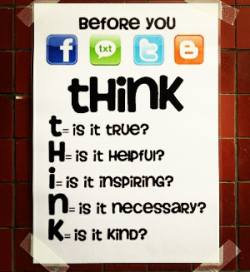5 Tips for Navigating to the Networked Economy

Wave goodbye to the Industrial Revolution.
There's a radical shift happening in the way we're learning, doing business, sharing ideas, and creating new things. It's global and it's moving fast.
Whenever major disruptive change occurs there are casualties - displaced workers, failing businesses and social upheaval.
And new unimagined opportunities if you're creative, motivated and pro-active.
Whether you're employed full time, provide a service to your local community, freelance on contract to business or make and sell your own products - you need to be thinking how you'll adapt to the networked economy.
You have two choices:
- Do nothing and hope for the best
- Take action and learn the ropes
Let's look at five things you can do to hit the ground running in the new economy.
Photo: Cloud Gate in downtown Chicago by kevin dooley [CC BY 2.0] on Flickr.

The robot revolution is underway - They're efficient, reliable and don't take coffee breaks...
Do you think your job could be done by a robot or computer?
Call it whatever you like
It's all about connecting, sharing, and networking
If you're paying atttention at all to what's going on in the global economy you've probably run across a lot of different terms for the economic shift that's underway - the post-industrial age, the information age, the networked age, the connection economy, the new economy, the sharing economy, etc. It's not surprising that there are so many names for it since it's still unfolding, it's disruptive and it cuts across all sectors of the economy.
No matter what you call it, it's affecting you right now, it's changing rapidly and it could eat your job, your clients or your retirement plans if you're still in denial. The speed of change is a direct result of open source technology, free information access, and idea sharing enabled by the internet and globalization. And we can't stop it. Nor should we.
For example, over the next decade, robots and software will be displacing human jobs like warehouse workers, travel agents, paralegals, and journalists. In twenty-five years they may even be driving our cars, buses and piloting planes more safely and efficiently than we can.
Photo: Human mobility network by dullhunk [CC BY 2.0] on Flickr.
1. Don't get caught by surprise - Look for the signs

If you're currently employed or looking for work, the first thing you need to do is start reading about what's going on in the technology sandbox. Find out what the technology futurists are indicating are the most likely human jobs to be replaced by robots or software.
In previous eras, technological change replaced brawn, which meant retraining workers to take on higher skilled (brain) jobs which grew the middle class. This time is different. Technology is threatening to take over some of those higher-skilled middle class jobs as well - with fewer obvious jobs that humans can transition to.
Ironically, most low-skill, low-wage jobs like flipping burgers, clearing tables and cleaning hotel rooms will remain firmly in the hands of humans due the relative complexity of the specific tasks involved. If your job involves a lot of repetitive tasks, reading or heavy lifting, but not a lot of creative input, you should be thinking about your plan B.
These changes won't all happen overnight, but unless you want to be in the demoralizing position of training a robot to do your job, you should be upgrading your skills and and knowledge to move up within your field or sowing the seeds for your next career move which may mean creating your own job.
Don't wait until something happens. Make something happen to prepare.
Photo: Rethink Robotics - Brooks and Baxter by jurvetson [CC BY 2.0
In the networked economy - Your office is everywhere
Mobility and connectivity are baked in to the networked economy. With today's technology, why tie yourself to a desk when you can be more productive on the go. Tablets, phones and laptops are essential gear.


2. Get visible online
That's where they're looking for you
Many people are already online in one way or another. This could be anything from simply being on Facebook to connect with friends and family to having multiple blogs, and organizing your whole social profile via Twittter, Google+, Reddit, Tumblr, Pin it, etc. Even if you work in the "real world" and only go online for Facebook, you should start familiarizing yourself with the tools of the network economy and keep up with global trends.
Here's a simple example of what I'd consider the bare minimum of establishing online visibility right now.
Let's say you do event planning from your home office. You have a yellow pages ad in the phone book and a sign up on your front lawn. More and more people (especially the younger generations) are ditching land line phones since they always have their smartphone with them. This trend is only going to grow over time. Phone books are linked to land lines - not smartphones.
Impact #1 - Yellow page ads are reaching a shrinking proportion of your potential clients
For the past ten years the phone book is the second place I look for information, even when shopping locally. Number one of course, is online. A third party directory listing doesn't cut it either. Today, you need at the very least to have an up-to-date information page that gives your location, business hours, contact info and hopefully information about what it is you offer as a product or service. Once they've look at your page, they'll check your competitors to see what they offer.
Impact #2 - Your first contact needs to impress tech-savvy customers
Have you checked out your competition is doing online recently? If not, do it right now.
Just because you're serving a local market in your community don't make the blunder of assuming that people who find you online will know where you are - they won't. I ran across a site recently offering dog care and boarding services. It was a nice looking site that outlined their services well and gave email and phone contacts. They just left out one little, but crucial detail - where they were.
Would you contact that dog boarding facility on the off-chance it might be in the City, State or Country you need it to be in? Nope.

3. Reputation matters
And nobody tells you about yours
Our reputation is something that follows us around whether we want it to or not. We can run but we can't hide from it. Good or or bad - we've earned it and we own it. So it's in our best interest to make sure it fits who we think we are - and more importantly - it's crucial that we make sure it reflects who we really are.
With the peer-to-peer nature of the connected economy, your reputation is your most valuable resource. Your online activities are like a credibility vapour trail that follows you wherever you go. Your website links, eBay track record, Klout score, Linked-in connections, number of Facebook friends can all be aggregated to tell your story for you - are you socially connected? Are you trustworthy? Do people follow you? Do you pay your bills? Are you in the habit of flying off on flaming rants?
These factors can all weigh on our credibility in the eyes of others who we may want to collaborate with, engage in conversation, or trust with future planning. The best way to maintain a good reputation online is to earn it the old fashioned way - by being honest, respectful, engaging, and a positive contributor to the global community.
But let's face it, nobody's perfect, and sometimes through our own brief lack of judgement, an unfortunate photo posted by a Facebook "friend" or a nasty attack by an ex we can end up with negative stuff that could pop up in a Google search. There are ways to handle any bad stuff you might have attached to your reputation. Take the proper action to minimize the damage and avoid self-inflicting damage in the future.
Photo: THINK before you... by ToGa Wanderings [CC BY 2.0] on Flickr.
4. Add value to the network - Quality counts

The fallout from the Great Recession and the technology transition will continue to have the greatest impact on the middle class, creating what economists are describing as the hourglass economy. Job growth and income levels are moving towards the top and the bottom of the curve, hollowing out the middle.
Companies like Proctor & Gamble whose growth was built on middle class America are already changing their product development and marketing strategies - targeting the high and low ends of the income scale. The middle is quickly disappearing with no replacement in sight.
So how do you value your product or service?
If you're employed, your "value" is essentially represented (fairly or not) by your wage. Some people, like today's CEOs, are grossly overvalued and others, like college grads serving coffee, are undervalued for at least part of their life. While many of us would like to earn more, we do what we can to make the most of our situation.
One of my favourite business catch phrases is "good, fast, cheap - pick any two". If you're an entrepreneur or freelancer you've no doubt run across clients that expect all three. If you promise all three, you'll lose your mind - or your shirt.
If you're considering turning a hobby into a business or setting up to freelance your services, give a lot of thought to what you value in a product or service. Even a new business will face competition and there are few "middle" markets left - so aim for high quality products and service since those are within your control. Unless you're a multi-national corporation, a business model based on the lowest price is a suicidal race to the bottom. The digital revolution continually drives prices towards free anyway - so it's a disastrous place to start.
After dealing with decades of declining quality and service in the global rat race of chasing cheap - even people of modest income are willing to pay for quality, originality, reliability and service. Why not go for the clientele that appreciates quality when they see it.
Photo: Only Quality, OK? by Aoife city womanchile [CC BY 2.0] on Flickr.

5. Customer service is key
Think like the customer
We've all been on the receiving end of poor customer service. Some people speak their mind at the time and let the owner or manager know about the problem - which allows the business the opportunity to apologize and rectify the situation - or at the very least, avoid the problem in the future. But it's much more likely that we'll just leave unhappy, never come back and share that bad experience story with everyone we know. Meanwhile, the poor service will continue to disappoint others and the businesses reputation will get worse over time.
The easiest way to avoid either of these situations is to simply provide the best customer service you can. Bend over backwards to make your customers' experience positive, give good value and prevent any sparks from bursting into flames.
It's not rocket science, it's common sense. Listen to your customers, find out what they want and find a way to give it to them if you can. If you can't deliver, tell them where they can get it. You may miss that sale, but they'll remember you the next time someone asks them about something you can provide. Become the go-to source for information as well as service and you increase your credibility and value in the network.
Word of mouth is your most valuable channel for spreading information about your business - you want your customers raving about it - not ranting.
Photo: Welcome by Ricymar Photography [CC BY 2.0] on Flickr.
See what's happening in the new economy
- The Longevity Economy: From The Elderly, A New Source Of Economic Growth
Aging boomers are a huge potential market for savvy young entreprenuers. - CROWD-SOURCING A "SHARED ECONOMY" WITHOUT JOBS
Walmart is considering giving customers a discount to deliver parcels to their neighbors.








